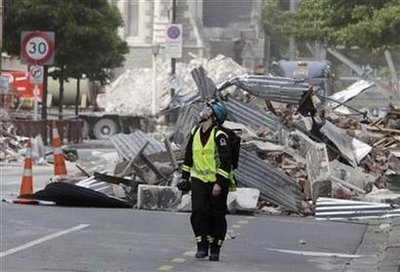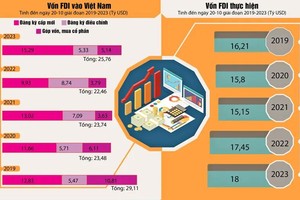The earthquake which shattered the New Zealand city of Christchurch on February 22 would cost the country up to NZ$15 billion ($11 billion) and will also wipe 1.5 percent off GDP over five years, Finance Minister Bill English said on Sunday.
"Paying for the earthquake will likely involve a balanced combination of a bit more borrowing in the short term and reconsidering our spending priorities," English said in a statement.
The Treasury estimated the total financial cost of damage from the earthquake at between NZ$10 billion and NZ$15 billion - two to three times the estimated NZ$5 billion cost of an earlier earthquake to strike the city last September.
In addition, the wider economic impact of the earthquake, combined with already slower economic growth than forecast, could leave nominal GDP a cumulative NZ$15 billion lower over the five years to 2015.

That is equivalent to about 1.5 per cent of the total value of GDP over this period, it said.
The Reserve Bank of New Zealand has held its key interest rate at 3.0 percent since September last year as the economy has struggled to pick up momentum and households and businesses cut spending. Unlike many other developed nations, the economy has shown few signs of gaining traction in recent months.
English said the government was still working through the potential impacts of the earthquake on GDP and the flow-through to tax revenue.
"But based on these early assumptions, the total loss of tax revenue from all of these factors could be in a range of NZ$3 billion to NZ$5 billion over the five years," he said.
"This is manageable in the context of the government's revenue base of about NZ$330 billion over the five years."
He said the earthquake will have an impact on the government's finances - through both increased costs and reduced tax revenue, and the government will work through those issues as it prepares for the May budget over coming months.
The latest death toll from the earthquake is 166, but is likely to rise above 200 as the search for survivors was officially called off on March 3, with buildings, roads, electricity and water infrastructure all severely damaged in the magnitude 6.3 shake.
Almost half the buildings in the city's central business district have collapsed or are unsafe to enter.
A Reuters poll showed analysts expect the RBNZ to react by cutting interest rates by 50 basis points at its next meeting on March 10, with growth expectations for 2011 scaled back.
The New Zealand dollar has been hit this week by the expectations of lower rates, falling to a 19-year trough against the Aussie and a 10-week low against the U.S. dollar.
English has previously said the government would bear any necessary cost after payments from insurance and its disaster fund were made to rebuild Christchurch.
The government would continue with its programme to rebalance the economy away from reliance on foreign debt through increased savings and exports, English said.
The wider Christchurch area, which was hit by a less-damaging 7.1 magnitude quake on Sept 4 which caused no fatalities, accounts for almost 10 percent of New Zealand's population and 15 percent of gross domestic product.
























